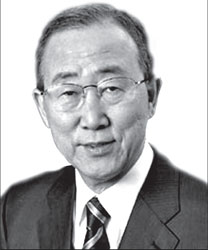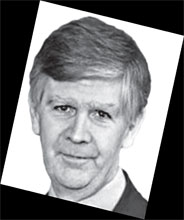How the discourse on Human Rights is perverted
 I was called up by the BBC when they received a leaked copy of the
Report to the Secretary General on the work of UN Agencies in Sri Lanka
during the conflict period. They wanted me to comment and, though they
would not share with me what they had, I agreed since I did not want the
debate to go by default. I was called up by the BBC when they received a leaked copy of the
Report to the Secretary General on the work of UN Agencies in Sri Lanka
during the conflict period. They wanted me to comment and, though they
would not share with me what they had, I agreed since I did not want the
debate to go by default.
|

UN Secretary General
Ban Ki-moon |
They promised to send me the text of what their correspondent Lyse
Doucette was posting on their website at 2 pm GMT. They would not send
this to me beforehand, though they said they could give me some time to
study it. Since however they were going on the air at 2pm, I thought I
should respond straight away, and this proved sensible, for even before
the email arrived, I saw the discussion begin on BBC television.
Radio actually gave me a reasonable time, though nothing like as much
as had been allowed all those who attacked Sri Lanka. TV, which followed
soon afterwards, cut me off after a couple of minutes, though they did
ask me to answer another question for a later programme.
They have not confirmed that this was used, and a friend in Britain
who accessed the link to the Newsnight programme found that I was not
there. Perhaps there was a mistake, but the track record suggests that
suppression is the order of the day. Lyse Doucette’s piece had comments
from several of the usual suspects, including Benjamin Dix who first
surfaced in Geneva in 2008, when the UN in Colombo apologized for his
antics.
He is joined now by someone called Edward Mortimer, who is involved
in something called the Sri Lankan Campaign. Not one of those she cites
on the piece put up on the Web challenged the basis on which the current
UN Report has been produced.
But we can scarcely complain about this, given that the authorities
has simply let this happen, without anticipating the problem
foreshadowed in the original Darusman Report.
I mentioned the need for this, and asking the UN to look at its own
records which had been ignored by the Darusman Committee.
The only response government made to the patent incompetence of the
Ministry at the time was to appoint Sajin Vaas Gunewardena as Monitoring
Member of Parliament, and he is supposed thereafter to have brought
order into the administration. I assume he was also expected to
contribute to policy making, but since the same approach as before
continued with regard to relations with the UN, I suppose he too was
overwhelmed by the prevailing ethos of waiting for crises and then
hitting out blindly on all sides.
What I said at the time, to quote from the letter I sent the
Secretary, was that we should ‘ensure correction of those aspects that
are clearly misleading of what is erroneously referred to as a UN
report.
At the same time, we should treat seriously aspects that are not
inaccurate and that create an adverse impression….. I have in several
publications drawn attention to errors, and I believe a summation of
these should be brought to the attention of the UN Secretary General. At
the same time he should be asked to respond to the queries on the
attached page, since they bear on the credibility of the report as it
has been compiled’.
Amongst the queries I suggested were -
* Did the Panel consult the heads of UN agencies in Sri Lanka with
regard to the various allegations contained in the Panel report, and in
particular those concerning;
a) Alleged rape
b) Deliberate deprival of humanitarian assistance
c) Unnecessary suffering for the displaced
d) Lack of information about rehabilitation sites?
It would be useful to ask the UN Secretary General to circulate the
letter of the UN Resident Coordinator with regard to conditions at the
camps….
* Did the Panel consult the head of the ICRC with regard to the
various allegations contained in the Panel report, and in particular
those concerning
a) Transportation of the wounded and others from conflict areas to
government hospitals, and the treatment received by these
b) Transportation of food and other supplies to the conflict area
|

UN Special Representative on the
Rights of the Displaced, Prof
Walter Kalin |
c) Information provided by the ICRC to government about conditions in
the conflict area, and in particular the establishment and operation of
medical centres.
It would be useful to ask the UN Secretary General to circulate the
letter of the ICRC head to the navy regarding its support for ICRC
operations, and to request reports from him with regard to these
matters. …
* Did the UN set up a ‘networks of observers who were operational in
LTTE-controlled areas’….. Was this with the authority of the UN Resident
Coordinator, and how did it fit within the UN mandate? With whom were
its reports shared? …
* Did the Panel consult the UN Special Representative on the Rights
of the Displaced, Prof Walter Kalin, and use the reports he published?
Were they aware that he visited Sri Lanka three times during this
period?
* Will the Panel explain errors such as the attribution to government
of actions relating to the LTTE (Footnote 92)….?
* Will the Panel provide sources for the various estimates mentioned
in Para 133, as well as all alternative estimates with regard to the
given figures? …..
* Has the Panel studied the reports of UN committees which make clear
the reluctance of agencies entrusted with funds for the benefit of Sri
Lankan displaced citizens to upgrade facilities at Manik Farm despite
numerous requests…..?
Recently too I have tried to suggest that we work together more
coherently with the UN.
But nothing was done, and now our friends too are being thrown to the
wolves, because we did nothing to produce a common, detailed response to
the calumnies. |







